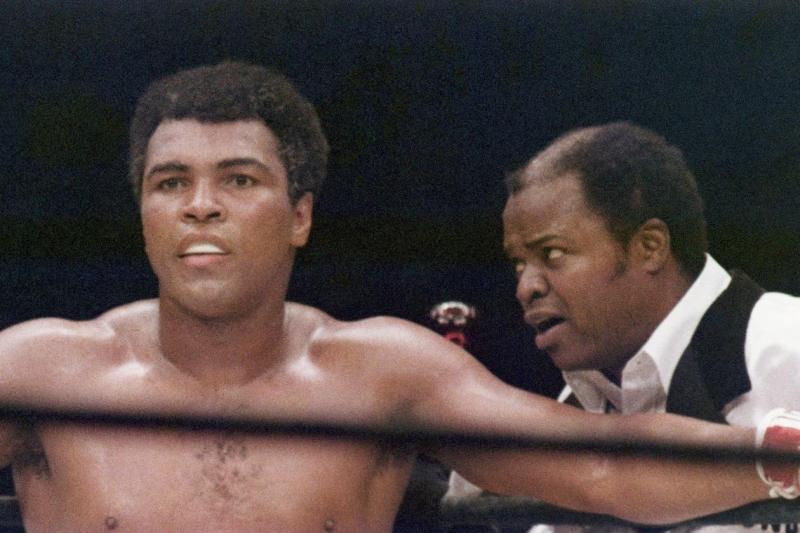'Bundini' Review: The Trickster in His Corner
By: Gordon Marino (WSJ)



One of the most popular figures in modern history, Muhammad Ali not only reshaped the self-image of athletes; he helped reshape the African-American sense of identity. There is good reason for the many books we have about him, including several since his death in 2016 at age 74.
One aspect of Ali’s life, though, has gone unexamined: his long and close relationship with Drew Brown Jr., a pre-eminent trickster and master motivator known to everyone as Bundini. With “Bundini: Don’t Believe the Hype,” Todd Snyder, a boxing aficionado and English professor at Siena College in upstate New York, fills the gap, offering fresh insights into Ali’s character along the way.
Born in 1928 and raised in the swampy, Ku Klux Klan country of central Florida, Brown used his brawn and native street smarts to sneak into the Navy as a young teenager, Mr. Snyder tells us. An inveterate Romeo, he was re-christened on one of his voyages: As his ship was pulling away from a port in India, some girls dockside cried out “Bundini! Bundini!”—a name he insisted meant “lover.” His shipmates happily took up his new moniker.
Upon discharge from the Navy, Bundini served in the Merchant Marine, moved to Harlem, married a Russian-Jewish woman, had a child, and somehow or other ended up working his magic for none other than Sugar Ray Robinson.
What was that magic, exactly? The knights of yore traveled with a squire, and not just because they needed help with their armor. They were in a hazardous profession and needed the succor and spirited fellowship of a reliable companion. Something similar holds true for boxers, especially at the highest levels of the sport. For the next several years, Bundini served as Sugar Ray’s “personal motivator,” Mr. Snyder writes, “leaning over the ropes during sparring sessions, cheering him on as he worked the double-end bag, urging him to victory from ringside.”
Before Robinson retired, he arranged for Bundini to meet Ali—or Cassius Clay, as he was then named. Robinson had told Clay that the fighter needed someone to give him “spiritual motivation.” When Bundini did meet the 23-year-old fighter (now an undefeated professional) in the mid-1960s, he was anything but polite. He was bothered by Clay’s habit of announcing the round in which he would KO his opponent—as he had done for a bout with Archie Moore. “Tell me the truth,” Bundini said. “Y’all got together and fix them fights, don’t you?” Taken aback, Clay denied any such thing. Bundini kept pressing him: “Tell me the truth.” Eventually the prince of braggadocio confided: “The truth is, every time I go into the ring, I’m scared to death.”
It proved to be a bonding moment. Shocked, Bundini pulled Clay to him in a hug. “I knew Shorty was with you,” he said, using his name for God. (He believed God worked on the side of the little people.) When Clay asked why he wanted to work his corner, Bundini replied: “Cause you got the power and I got the spirit.” Truer words have never been spoken. They were together for the next 15 years of Ali’s boxing career and close friends thereafter.
When Ali was withering in a hammer-and-tong battle—as in his third fight with Joe Frazier—Bundini would lean in just before the bell sounded and whisper: “Shorty is watching you.” In camp, Bundini was a factotum who did everything for his charge. As he woke Ali for roadwork in the morning, Mr. Snyder reports, Bundini would remind him: “You can’t have the smiles without the miles.”
Outside the ring, Ali hated being alone, as Mr. Snyder notes; but he never felt as at home in himself as he did when Bundini was at his side. With zingers that were like pep pills, Bundini was the only one with a direct line to Ali’s soul. The two men did have their tiffs. Though pressured to follow Ali and join the Nation of Islam, Bundini refused, rejecting its segregationist beliefs. Nor could he approve of Ali’s ridicule (“Uncle Tom,” “gorilla”) of Joe Frazier.
For all his motivational powers, Bundini had trouble managing his own life. He was a heavy drinker and as impulsive as a troubled teen. One of Mr. Todd’s major sources for this book is Bundini’s son, Drew Brown III, a Navy fighter pilot. Cmdr. Brown doesn’t try to hide his dad’s alcoholism, infidelities and long absences, and yet the love and admiration for his father are evident whenever he is cited.
Mr. Snyder writes lyrically, and his research appears to be impeccable: It’s hard to imagine that anyone has slipped through his interview net. If “Bundini” has a blemish, it is Mr. Snyder’s inclination to spar with competing Ali chroniclers; he wins these sessions, for the most part, but in the process disrupts the otherwise smooth flow of his story.
Near the end of “Bundini,” Mr. Snyder describes an intimate scene in a hospital room: Bundini is terminally ill, and Ali has come to visit. (A friend of Ali’s, Victor Solano, was present and conveyed the details to the author.) “Ali held his own hand to Bundini’s cheek. . . . After a few moments of silence, Ali bent down and kissed Bundini on the forehead. . . . ‘Drew, can you hear me?’ Ali asked. Bundini once again tilted his head to indicate his response. ‘Float like a butterfly, sting like a bee. . . . Rumble young man, rumble,’ Ali said.”
When Bundini died—in September 1987, at age 59—Ali was abroad and unable to attend the funeral, but he sent flowers with a card that read: “You made me the greatest.” Many members of the boxing fraternity, George Foreman and Larry Holmes included, think that Ali wasn’t exaggerating. Mr. Snyder’s affecting portrait will convince the rest of us as well.
Mr. Marino is a professor of philosophy at St. Olaf College and the author of “The Existentialist’s Survival Guide: How to Live Authentically in an Inauthentic Age.”

 Article is LOCKED by author/seeder
Article is LOCKED by author/seeder
Tags
Who is online
467 visitors


This would also be a story of "you can do it - anyone can do it.
After all Ali had to make many comebacks.
(Only one world Champion of any weight retired completely undefeated and it wasn't Ali).